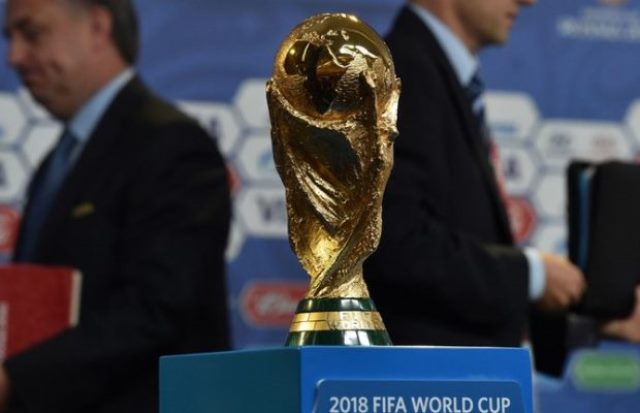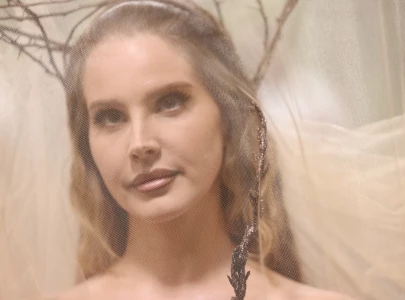
Russia was a controversial choice when it was handed the rights to the world's most watched event in a 2010 vote now tainted by bribery charges.
That choice is possibly only more controversial today.
The years since have seen Moscow clash with the West over everything from Syria and Ukraine to the poisoning of a former Russian double agent in England.
Russia was even banned as a country from this winter's Pyeongchang Olympics after being accused of state-sponsored doping at the Sochi Games it hosted four year earlier.
The diplomatic barbs have been laced with Cold War-era venom and accompanied by the largest expulsion of diplomats in history.
Yet Vladimir Putin is riding as high today as he was eight years ago.
The former KGB spy's popularity with Russians remains unshakeable and his presence on the international arena is more dominant than when he first came to power in 2000.
The scandals and diplomatic wrangles have failed to generate a repeat of the boycott that saw nearly half the world stay away from the 1980 Moscow Olympics over the Soviet invasion of Afghanistan.
And Putin will have the chance to wield the "soft power" afforded by the football showpiece to project himself as a man of domestic achievement and global bearing.
Yet the tournament also comes riddled with peril for Putin.
Russia has spent in excess of $13 billion, a World Cup record, on giving many of the 11 host cities their first post-Soviet facelifts.
Host city Saransk, for example, is best known for being the capital of a deserted region where Russia has set up female penal colonies.
Airports were rebuilt and expanded to accommodate crowds whose size Russia may not see again for some time.
Sleek hotels have gone up in places tourists rarely venture.
Twelve voluminous stadiums now loom over cities in the European part of Russia after being completed in the nick of time.
A part of Putin's legacy will hinge on what happens to it all when the fans go home.
The $50 billion believed to have been spent on the 2014 Winter Olympics in Sochi has had mixed results.
The Black Sea resort city looks modern and feels electric. Residents whizz around on silky smooth roads and travel in style from a comfortable airport and train station.
But the surrounding mountains that hosted the snow events are filled with abandoned hotels and FIFA will want to avoid such "white elephants".
Seeing the World Cup transform other cities into what Sochi itself has become will be a monumental achievement that could unlock Russia's economic potential.
Filling them with prestigious buildings no one ever uses will turn into another expensive mistake.
Fans themselves will care little about the politics. Their main concern will be safely and swiftly getting to stadiums for the matches.
Those who plan to follow their team as they criss-cross from one venue to the next will be confronted with Russia's sheer scale.
The 2,500 kilometres (1,500 miles) spanning the westernmost stadium in Kaliningrad and easterly one in Yekaterinburg translates into the distance between Moscow and London.
Brazil suffer Alves blow ahead of World Cup
Host cities are four time zones apart and compare best to the travel teams and fans had to endure in the 1994 World Cup in the United States.
Foreigners will be further burdened by having to register with the police within a day of arriving in each new location.
Some will also be fearful of Russia's history of hooliganism and racist abuse that has marred a string of recent matches.
Putin's security services cracked down hard on football troublemakers to ensure there is no repeat of the battles that broke out between Russian and English fans at Euro 2016 in France.
And football anti-discrimination chief Alexei Smertin has spent the past year trying to eradicate racist behaviour in stadiums.
"We need to introduce personal responsibility so that fans who violate rules start being denied the right to go to stadiums and support their teams," he said after more monkey chants rang out last month.
FIFA boss Gianni Infantino wore a big grin in Sochi last week as he congratulated Putin for all Russia had already achieved.
"You are working to make this World Cup the best World Cup ever," Infantino said.
Yet the chances of Putin celebrating many Russian triumphs on the pitch remain marginal. The host nation are the tournament's second-lowest ranked team and have not won any of their last five matches.
"Without Italy, it just doesn't feel like a World Cup": Dino Zoff
Putin is a sports fanatic who will be present when Russia face Saudi Arabia — the one nation at the World Cup ranked below them — at Moscow's Luzhniki Stadium on June 14.
Russia will attempt to make the knockout stage of a major tournament for the first time in 10 years and have a relatively easy group.
But coach Stanislav Cherchesov has nowhere near the class of players of the likes of Portugal's Cristiano Ronaldo or Brazil's Neymar — only goalkeeper Igor Akinfeev is a name known abroad.
Yet Putin spelled out clearly that he expected something special from the Russians at their first home World Cup.
"They must show gutsy, uncompromising football, one which the fans love," the president said in Sochi.

1732569774-0/Baymax-(2)1732569774-0-165x106.webp)















COMMENTS
Comments are moderated and generally will be posted if they are on-topic and not abusive.
For more information, please see our Comments FAQ